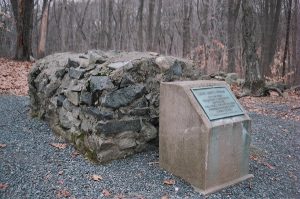Free Lecture Series Launches at Museum of Work & Culture January 10
Virtual Valley Talks Kickoff with King Philip’s War Presentation

WOONSOCKET, R.I. – Valley Talks, a series of biweekly historical lectures by the Museum of Work & Culture, begins Sunday, January 10.
All events are free and take place at 1pm on Zoom. This year’s series is presented as part of the Rhode Island Historical Society’s Taking a Stand in Rhode Island, a yearlong examination of how the people who have called this place home, from the 17th century to the recent past, have identified aspects of society that needed to shift and how they worked to change them.
The series will kick-off with History All Around Us: King Philip’s War, a talk by National Park Ranger John McNiff.
Called the deadliest war in American history, King Philip’s War was fought right here in southern New England. Roads, landmarks, and businesses all mirror names from this war. But what was really happening? Why, after 2 or 3 generations of Native People and English living side by side did this war come about?
Individuals can register for the talk by visiting
McNiff was born and brought up in RI. He attended Rhode Island College and received his BA in History with a minor in Anthropology in 1979. He spent the summer of 1980 studying archaeology in England through Christ’s College, Cambridge University, and then came back to the US where he worked as a commercial fisherman, in sales, and advertising.
In 1984 he began graduate studies at SUNY Binghamton, now Binghamton University in NY, studying Anthropology, specializing in Archaeology.
He worked with the Public Archaeology Lab, Inc of Pawtucket and Rhode Island College’s Public Archaeology Program on numerous archaeological projects around New England the 1980s and 1990s.
In 1988 he was part of a National Science Foundation funded expedition to map archaeological sites in the Sonoran Desert in northwest Mexico. He received his MA in Anthropology, specializing in archaeology, in 1990 from Binghamton University. In 1996 McNiff began working with the National Park Service and in 1997 was stationed as a Park Ranger at the Roger Williams National Memorial on North Main Street in Providence where he has presented countless public programs for schools, libraries, historical societies and visitors from all over the world.
He has also consulted, worked on and appeared in several films about the colonial period and particularly dealing with the early Colonial history of Rhode Island.
Other Valley Talks will include:
January 24: Writer & professor Erik Chaput will present on the life of Thomas Wilson Dorr and the 1842 rebellion for constitutional reform in Rhode Island that bears his name.
February 7: Filmmaker Christian de Rezendes will screen a piece of the in-progress Slatersville: America’s First Mill Village, which will focus on the man who purchased the Slatersville mill and village in 1915.
February 21: Writers Rebecca Altman and Kerri Arsenault will explore their work about New England manufacturing and the environmental, political, and personal legacies it has left behind.
March 7: Writer and historical reenactor Paul Bourget will examine the Sentinelle Affair, the local underground movement that led to the excommunication of 61 congregants.
March 21: Author David Vermette will discuss how the U.S. mainstream perceived French-Canadians when they were an immigrant community in New England at the turn of the 20th century.
2021 Virtual Valley Talks
January 10 and 24; February 7 and 21; March 7 & 21
About the Museum of Work & Culture
The interactive and educational Museum of Work & Culture shares the stories of the men, women, and children who came to find a better life in Rhode Island’s mill towns in the late 19th- and 20th centuries. It recently received a Rhode Island Monthly Best of Rhode Island Award for its SensAbilities Saturdays all-ability program.
About the Rhode Island Historical Society
Founded in 1822, the RIHS, a Smithsonian Affiliate, is the fourth-oldest historical society in the United States and is Rhode Island’s largest and oldest historical organization. In Providence, the RIHS owns and operates the John Brown House Museum, a designated National Historic Landmark, built in 1788; the Aldrich House, built in 1822 and used for administration and public programs; and the Mary Elizabeth Robinson Research Center, where archival, book and image collections are housed. In Woonsocket, the RIHS manages the Museum of Work and Culture, a community museum examining the industrial history of northern Rhode Island and of the workers and settlers, especially French-Canadians, who made it one of the state’s most distinctive areas.